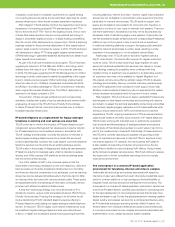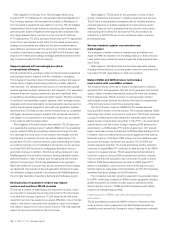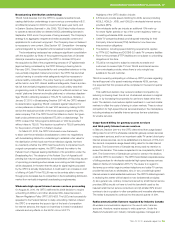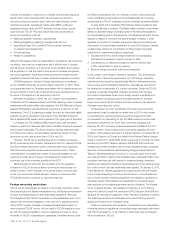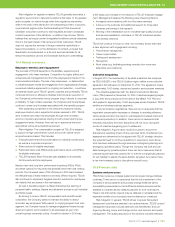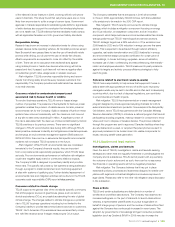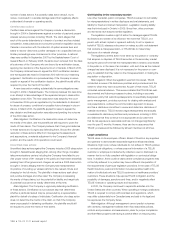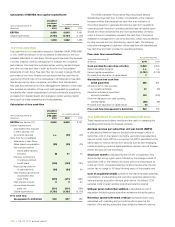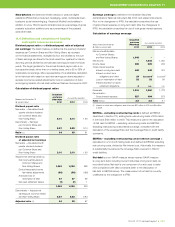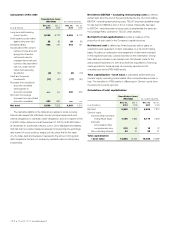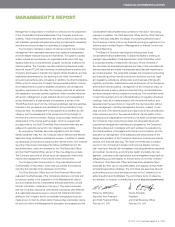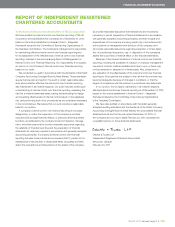Telus 2010 Annual Report Download - page 109
Download and view the complete annual report
Please find page 109 of the 2010 Telus annual report below. You can navigate through the pages in the report by either clicking on the pages listed below, or by using the keyword search tool below to find specific information within the annual report.
TELUS 2010 annual report . 105
MANAGEMENT’S DISCUSSION & ANALYSIS: 10
The Company estimates that its emissions in 2010 will be similar
to those in 2009, approximately 320,000 tonnes, with final publication
of its emissions to be made in the 2010 CSR report.
Risk mitigation: TELUS recently announced its climate change
strategy, which includes a mitigation component focusing on energy
and CO2e reduction, an adaptation component, and an innovation
component, which helps customers and communities realize their climate
change goals through TELUS’ technological and service solutions.
TELUS’ strategic targets are a 25% reduction in CO2e emissions over
2009 levels by 2020 and a 10% reduction in energy use over the same
period. This is expected to be achieved through network efficiency
upgrades, real estate transformation and LEED (leadership in energy
and environmental design) principles certification for construction of
new buildings, in-house technology upgrades, server virtualization,
increased use of video-conferencing and teleconferencing, fleet transfor-
mation and employee education. TELUS measures its yearly emissions
against its targets and actively pursues efficiency strategies to help
reach its goals.
Concerns related to electronic waste (e-waste)
TELUS has a responsibility to help ensure that equipment it uses or
sells is dealt with appropriately at the end of its life cycle. Improperly
managed e-waste may be sent to landfills and is often sent to developing
countries which, due to a lack of disposal regulations, can contribute
to environmental and health impacts.
Risk mitigation: TELUS has implemented an e-waste management
program designed to provide approved recycling channels for both its
external and internal electronic products. One example is the Recycle My
Cell initiative, where TELUS has partnered with the Canadian Wireless
Telecom Association (CWTA) to introduce a national program that links all
participating recycling programs, making it easier for consumers to know
where and how to dispose of wireless devices. The phones collected
through this program are sent to approved Canadian facilities where they
are refurbished and re-used, or recycled. Recycled phones are sent to
approved processors to be broken down into usable components for
resale, reducing landfill waste generation.
10.9 Litigation and legal matters
Investigations, claims and lawsuits
Given the size of TELUS, investigations, claims and lawsuits seeking
damages and other relief are regularly threatened or pending against the
Company and its subsidiaries. TELUS cannot predict with any certainty
the outcome of such actions and as such, there can be no assurance
that financial or operating results will not be negatively impacted.
Risk mitigation: The Company believes that it has put in place
reasonable policies, processes and awareness designed to enable com-
pliance with legal and contractual obligations and reduce exposure to
legal claims. Please also refer to the other risk mitigation steps discussed
in this subsection.
Class actions
TELUS and certain subsidiaries are defendants in a number of
certified and uncertified class actions. The Company has observed an
increased willingness on the part of claimants to launch class actions
whereby a representative plaintiff seeks to pursue a legal claim on
behalf of a large group of persons, and the number of class actions filed
against the Company has continuously increased in recent years. The
adoption by governments of increasingly stringent consumer protection
legislation (such as Quebec’s Bill 60 in 2010) may also increase the
of the National Cancer Institute in 2006, involving 420,000 cell phone
users in Denmark. This study found that cell phone users are no more
likely than anyone else to suffer a range of cancer types. Government
agencies in Canada responsible for establishing safe limits for signal levels
of radio devices also support the conclusion that wireless telephones
are not a health risk. TELUS believes that the handsets it sells comply
with all applicable Canadian and U.S. government safety standards.
Responsible driving
Research has shown an increase in distraction levels for drivers using
wireless devices while operating vehicles. All Canadian provinces except
New Brunswick have passed laws to ban the use of handheld mobile
phones while driving, but do permit the use of hands-free devices.
Alberta requirements are expected to come into effect by the middle
of 2011. There can be no assurance that additional laws against
using mobile phones or hands-free devices while driving will not be
passed and that, if passed, such laws will not have a negative effect
on subscriber growth rates, usage levels or wireless revenues.
Risk mitigation: TELUS promotes responsible driving and recom-
mends that driving safely should be every wireless customer’s first
responsibility. The Company provides and sells hands-free devices
in its retail channels.
Concerns related to contaminated property and
associated risk to human health or wildlife
To conduct business operations, TELUS owns or leases a large
number of properties. The presence of fuel systems for back-up power
generation enables the provision of reliable service, but also poses an
environmental risk for the Company. Spills or releases of fuel from these
systems have occurred occasionally, with the maximum cost incurred
at any site to date rarely exceeding $1 million. A significant portion of
this risk is associated with the clean-up of sites contaminated by historic
TELUS practices or by previous owners. There were no significant
changes to TELUS’ environmental risks during 2010. Although TELUS
takes proactive measures to identify and mitigate environmental exposures
and employs an environmental management system (EMS) based on
ISO14001:2004, there can be no assurance that specific environmental
incidents will not impact TELUS operations in the future.
Risk mitigation: While TELUS’ environmental risks are considered
immaterial to the Company’s financial results, they are important
from a corporate social responsibility perspective, which TELUS takes
seriously. Poor environmental performance or ineffective risk mitigation
could have negative legal, brand or community relations impacts.
The Company’s EMS is designed to proactively identify and prioritize
these risks. The specific risk posed by fuel systems is being addressed
through a program to install containment and monitoring equipment
at sites with systems of qualifying size. Further detailed assessment of
environmental risks and mitigation activities can be found in the TELUS
corporate social responsibility (CSR) report at telus.com/csr.
Concerns related to climate change
TELUS supports the general view of the worldwide scientific community
that anthropogenic sources of greenhouse gases, such as carbon
dioxide equivalency (CO2e), are possibly accelerating the rate of global
climate change. The changes related to climate change are a potential
risk to TELUS’ business operations including but not limited to the
Company’s ability to provide telecommunications services to customers.
TELUS’ North American CO2e emissions have remained fairly consis-
tent with little variance since it began measuring its CO2e output.


